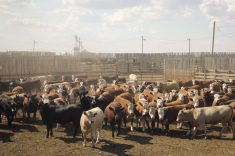Chicago | Reuters—Chicago wheat futures plunged to contract lows on Tuesday to approach their lowest point since 2020 as sinking corn futures and seasonal supply pressure from Northern Hemisphere harvests weighed on the market, traders said.
Corn edged down to set fresh contract lows, with steady U.S. crop conditions and expectations of a bumper U.S. corn harvest keeping the focus on ample supply.
Soybeans chopped up and down, supported by larger-than-expected weekly U.S. export inspections, though a lack of Chinese demand weighed on the market.
Read Also

U.S. grains: Soybeans rise on export optimism; corn, wheat nearly flat
Chicago | Reuters – Chicago soybean futures rose about one per cent on Tuesday on optimism about demand for U.S….
The most-active wheat contract on the Chicago Board of Trade Wv1fell 8-1/2 cents to $5.08-1/4, with all wheat contracts hitting contract lows. CBOT December corn CZ25 fell 5 cents to close at $4.02 a bushel.
“Wheat’s had a rough run of it. Corn and wheat have taken turns taking each other lower,” said Jim Gerlach, president of A/C Trading.
Rain has also eased concerns over dryness affecting wheat in Canada, as well as in Southern Hemisphere exporters Australia and Argentina. Recent updates on the state of the U.S. corn crop have also weighed on prices.
CBOT November soybeans SX25 settled down 3-3/4 cents to $9.90-3/4 per bushel as China continued to shun purchases of U.S. soybeans.
Commodity brokerage StoneX projected on Monday U.S. 2025 corn production at 16.323 billion bushels, above the U.S. Department of Agriculture’s latest corn harvest projection. The USDA on Monday also reported that 73 per cent of the corn crop was in good to excellent shape, a nine-year high.
“China is normally buying at this time of year. Beans have more of a demand problem rather than supply problem. Until we see evidence that China is buying beans, it’s going to be hard for soy to rally,” Gerlach said.
Meanwhile, Archer-Daniels-Midland posted its lowest second-quarter profit in five years on Tuesday as U.S. trade upheaval and uncertainty around biofuel policies slowed sales and crimped trading and crop processing margins.
—Additional reporting by Gus Trompiz in Paris and Peter Hobson in Canberra.













